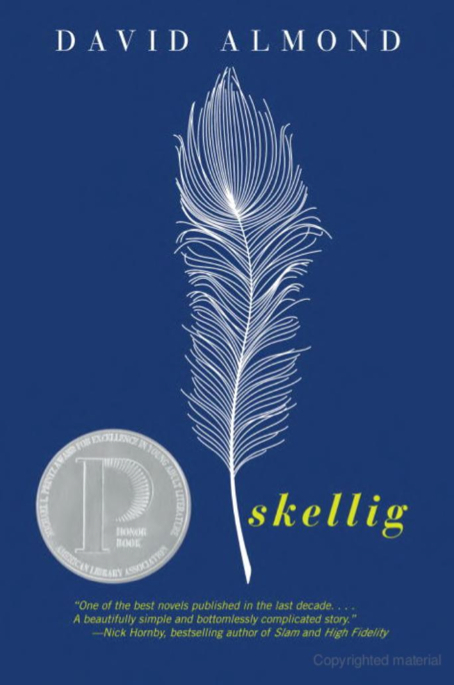 Who is Skellig? What is Skellig? These are answers that David Almond raises in his eponymous novel, but does not answer. Usually, such an omission would be troubling to readers requiring closure in their fiction, but Almond’s characteristic style leaves us not troubled, but hopeful and at peace. Like other of Almond’s novels (in fact, all I have read), Skellig affirms his position as one of the foremost “creator[s] of magical realism for children,” as he was labelled by the jury of the Hans Christian Anderson award in 2010. It is this melding of the magical with everyday life that imbues Skellig with a sense of the surreal that not only captivates, but causes the novel to linger in the reader’s mind long after the reading is over.
Who is Skellig? What is Skellig? These are answers that David Almond raises in his eponymous novel, but does not answer. Usually, such an omission would be troubling to readers requiring closure in their fiction, but Almond’s characteristic style leaves us not troubled, but hopeful and at peace. Like other of Almond’s novels (in fact, all I have read), Skellig affirms his position as one of the foremost “creator[s] of magical realism for children,” as he was labelled by the jury of the Hans Christian Anderson award in 2010. It is this melding of the magical with everyday life that imbues Skellig with a sense of the surreal that not only captivates, but causes the novel to linger in the reader’s mind long after the reading is over.
It all begins when young Michael finds Skellig in an old garden shed. The emaciated, hunch-backed Skellig had not made contact with the home’s previous, curmudgeonly owner, and is slow to accept Michael’s help. But Michael knows he needs it, and solicits the assistance of his new neighbour, Mina, to help keep Skellig safe. Mina is home-schooled, as her parents, as Mina expounds, “believe that schools inhibit the natural curiosity, creativity, and intelligence of children” (49). Mina presents an alternate way of thinking—of viewing the world—that opens up to Michael and the reader existential possibilities that traditional schooling and ideas do not permit. Almond relies on his readers’ acceptance of possibilities outside of the realm of consensus reality in order for them to fully accept Skellig as a legitimate being.
Skellig’s wings suggest an association with angels, yet Skellig himself says that he is “something like you, something like a beast, something like a bird, something like an angel… something like that” (167). Like the children, we will never really know, but there is a magic in Skellig: in his winged dancing with the children; in his saving of Michael’s critically ill little sister; in his three feathers, left for Michael, Mina, and the baby, Joy. We are left in a place of wonder, satisfied that although there maybe much in our world that we do not understand, that we can only believe, that such powers are not always evil and threatening, as reason—or perhaps the adult world—would have us believe.